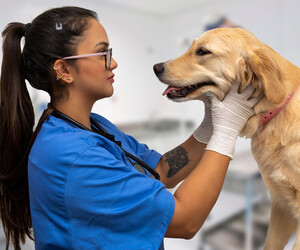Discovering the Right Veterinarian Enterprise for Your Pet's Health care Needs
Discovering the Right Veterinarian Enterprise for Your Pet's Health care Needs
Blog Article
Vaccination Guidelines From Your Trusted Vet
Vaccination standards supplied by your trusted veterinarian play a vital duty in securing your family pet's health and wellness. Core vaccines are basic for all pets, while non-core vaccines can be tailored to specific lifestyles and ecological direct exposures. Understanding the nuances of inoculation routines, which start as very early as six to 8 weeks, is essential for optimum protection. Additionally, resolving common mistaken beliefs surrounding vaccines can better enhance animal proprietors' confidence in these safety nets. As we check out these vital aspects, it comes to be increasingly clear why normal examinations with your veterinarian are crucial for informed decision-making.

Value of Vaccinations
Inoculations play a critical function in guarding animals versus a series of avoidable diseases. By stimulating the immune system to identify and deal with certain virus, vaccinations dramatically lower the incidence of infectious diseases that can impact a pet dog's health and long life. Not just do vaccinations shield private animals, but they also add to herd immunity, thereby decreasing the overall occurrence of diseases in the pet dog population.
Prompt vaccinations aid to alleviate the spread of diseases such as rabies, parvovirus, and distemper, which can have serious consequences for both humans and family pets. In addition, vaccinations are frequently a need for boarding centers, grooming solutions, and dog parks, making them crucial for those who wish to mingle their animals.

Core Injections for Animals
While the specific inoculation needs of pet dogs can differ based on specific aspects, core vaccines are globally advised to safeguard versus the most major and usual illness (Pet Health Checkup). Core vaccines are those regarded important for all pet dogs, regardless of their way of living or geographic area, as they protect versus potentially fatal and highly transmittable diseases
For pets, the core vaccines include those for canine distemper, parvovirus, adenovirus (hepatitis), and rabies. Adenovirus can result in liver illness, while rabies is a zoonotic illness that postures a risk to both humans and pets.
In felines, core injections incorporate feline panleukopenia, feline calicivirus, feline herpesvirus (rhinotracheitis), and rabies. Feline panleukopenia is a very infectious viral condition that influences the body immune system and intestinal tracts. Calicivirus and herpesvirus are significant factors to top respiratory system infections in pet cats, while rabies continues to be an important problem for public health.
Speak with your vet to ensure your pet dogs obtain their core inoculations on time.
Non-Core Vaccines Explained
Non-core injections are customized to address specific threats connected with an animal's setting, way of life, and direct exposure to particular illness. Unlike core vaccines, which are universally advised for all family pets, non-core injections are considered based upon individual circumstances. These vaccines are especially vital for family pets that may encounter one-of-a-kind virus due to their geographical area, travel behaviors, or tasks.
Instances of non-core vaccines consist of those for Bordetella bronchiseptica, which is linked to kennel cough, and Lyme disease, brought on by ticks. Family pets that frequently engage with various other animals, such as those in boarding centers, pet dog parks, or brushing settings, might gain from Bordetella vaccination. If you live in an area where Lyme disease is widespread, vaccinating against this condition can be a prudent selection helpful resources for outdoor-loving pet dogs.
Various other non-core vaccines may include those for leptospirosis, canine influenza, and feline leukemia, depending upon the specific risk aspects existing. It is essential to have a thorough discussion with your vet regarding your pet's way of life and the prospective demand for these vaccinations, guaranteeing a customized inoculation strategy that best protects your fuzzy friend.
Vaccination Schedule Review

As pet dogs mature, it is essential to follow the recommended booster inoculations. Vet Enterprise. For adult pets, core injections are usually given each to 3 years, depending on the certain injection and neighborhood regulations. Non-core vaccines may be recommended based upon way of living variables and regional condition prevalence, necessitating a tailored approach
Normal veterinary check-ups are vital for upgrading inoculation timetables. Your vet can offer guidance on one of the most ideal immunizations for your animal, considering age, wellness status, and ecological risks. By staying proactive and notified, family pet owners can ensure their useful content furry companions receive timely and effective inoculations, therefore safeguarding their wellness and health throughout their lives.
Typical Myths About Vaccines
False impressions concerning family pet vaccinations can lead to complication and hesitation among animal proprietors regarding the booster shot process. One prevalent misconception is that vaccines are unnecessary for interior animals. While it holds true that interior family pets encounter lower risks, they are not entirely immune to conditions, as virus can be introduced via various means, consisting of human apparel and various other animals.
One more false impression is that vaccinations can cause the conditions they aim to stop. In truth, most injections contain suspended or attenuated virus, which can not cause condition in healthy pets. Some pet dog proprietors also believe that their pet dogs ought to not be immunized if they are already healthy and balanced; however, inoculations are a proactive procedure that helps stop the onset of health problem.
Additionally, lots of pet owners are afraid that vaccines will result in long-term health and wellness issues. While adverse effects can occur, they are short-lived and normally mild. The benefits of vaccination-- securing pet dogs from potentially life-threatening diseases-- far exceed the threats. Understanding these common misconceptions is essential for accountable family pet possession and ensuring the health and wellness of your fuzzy buddies. Always consult your veterinarian for accurate information tailored to your animal's particular needs.
Final Thought
In summary, adherence to vaccination standards is critical for making certain the wellness and longevity of pet dogs. Core vaccinations give crucial defense against significant conditions, while non-core injections deal with details threats based upon private lifestyles. Developing an extensive inoculation timetable, in combination with regular vet webpage exams, promotes optimum health and wellness administration. Dispelling usual myths surrounding inoculations even more reinforces the relevance of notified decision-making in pet dog treatment. Ultimately, a proactive approach to inoculations is vital for keeping animal well-being.
Not just do vaccinations secure private pets, but they additionally contribute to herd immunity, thereby decreasing the general frequency of illness in the animal populace.
Mistaken beliefs concerning pet vaccinations can lead to complication and hesitation among family pet owners concerning the booster shot process. While it's true that interior family pets encounter lower risks, they are not entirely immune to conditions, as microorganisms can be introduced through numerous methods, consisting of human clothing and various other animals.
Some pet proprietors likewise believe that their animals should not be immunized if they are already healthy; nevertheless, vaccinations are a positive procedure that helps protect against the start of illness.
The advantages of inoculation-- securing pets from possibly life-threatening illness-- much outweigh the threats.
Report this page